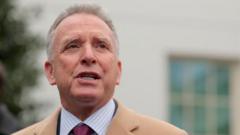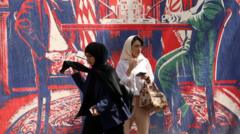In a significant diplomatic move, the United States has publicly confirmed it sent a new proposal for a nuclear deal to Iran, an announcement made by the White House over the weekend. The proposal unfolded through discussions facilitated by Omani officials, who relayed the outlined deal to Iranian Foreign Minister Abbas Araghchi during his recent visit to Tehran.
US Proposes New Nuclear Deal to Iran Amidst Heightened Tensions

US Proposes New Nuclear Deal to Iran Amidst Heightened Tensions
The Biden administration has submitted a fresh proposal to Iran in a bid to revive negotiations over its nuclear program, coinciding with concerns over Iran's uranium enrichment levels.
The timing of this proposal aligns with troubling reports from the International Atomic Energy Agency (IAEA), indicating that Iran has intensified its uranium enrichment, merging closer to weapon-grade levels. White House spokesperson Karoline Leavitt emphasized the necessity for Iran to accept the proposal, asserting Iran's interests would be best served through this diplomatic engagement. Special envoy Steve Witkoff is at the forefront of the American diplomatic efforts in this renewed engagement with Tehran.
Araghchi responded to the proposal through a post on social media, asserting that Iran would address the proposal guided by its national principles and rights. However, the primary aspects of the proposal remain undisclosed, leaving both domestic and international observers in anticipation.
The IAEA report raised alarms as it highlighted that Iran now has more than 400 kg of uranium enriched to 60% purity, an alarming statistic as it approaches the 90% threshold characteristic of weapon-grade material. This data positions Iran among the few countries, namely non-nuclear states, in the domain of high-enrichment levels, generating concern among global powers involved.
As a result of this development, the United States, alongside its European allies, are considering further actions at the IAEA to hold Iran accountable for alleged violations of its non-proliferation commitments. In contrast, Iran continues to assert that its nuclear pursuits are strictly peaceful, with state media dismissing the IAEA's allegations as "politically motivated."
Efforts to negotiate a nuclear deal have been ongoing since April, yet fundamental disagreements remain, particularly over Iran's continued enrichment activities. Urgent discussions are essential to address these discrepancies as Iran reportedly enriches uranium swiftly, potentially enabling it to develop nuclear weapons capability in mere weeks.
Meanwhile, the US's overarching goal is to restrain Iran's nuclear developments, a pursuit that has witnessed a backdrop of heightened sanctions and political tensions since President Trump withdrew from the Joint Comprehensive Plan of Action (JCPOA) in 2018. The renewed diplomatic efforts come amidst fears that Iran's nuclear advancements could provoke regional and global instability.
Overall, the outcomes of these talks remain uncertain, with both sides tentatively optimistic yet deeply divided over core issues, underlining the complexity of navigating nuclear diplomacy with Iran.
Araghchi responded to the proposal through a post on social media, asserting that Iran would address the proposal guided by its national principles and rights. However, the primary aspects of the proposal remain undisclosed, leaving both domestic and international observers in anticipation.
The IAEA report raised alarms as it highlighted that Iran now has more than 400 kg of uranium enriched to 60% purity, an alarming statistic as it approaches the 90% threshold characteristic of weapon-grade material. This data positions Iran among the few countries, namely non-nuclear states, in the domain of high-enrichment levels, generating concern among global powers involved.
As a result of this development, the United States, alongside its European allies, are considering further actions at the IAEA to hold Iran accountable for alleged violations of its non-proliferation commitments. In contrast, Iran continues to assert that its nuclear pursuits are strictly peaceful, with state media dismissing the IAEA's allegations as "politically motivated."
Efforts to negotiate a nuclear deal have been ongoing since April, yet fundamental disagreements remain, particularly over Iran's continued enrichment activities. Urgent discussions are essential to address these discrepancies as Iran reportedly enriches uranium swiftly, potentially enabling it to develop nuclear weapons capability in mere weeks.
Meanwhile, the US's overarching goal is to restrain Iran's nuclear developments, a pursuit that has witnessed a backdrop of heightened sanctions and political tensions since President Trump withdrew from the Joint Comprehensive Plan of Action (JCPOA) in 2018. The renewed diplomatic efforts come amidst fears that Iran's nuclear advancements could provoke regional and global instability.
Overall, the outcomes of these talks remain uncertain, with both sides tentatively optimistic yet deeply divided over core issues, underlining the complexity of navigating nuclear diplomacy with Iran.




















